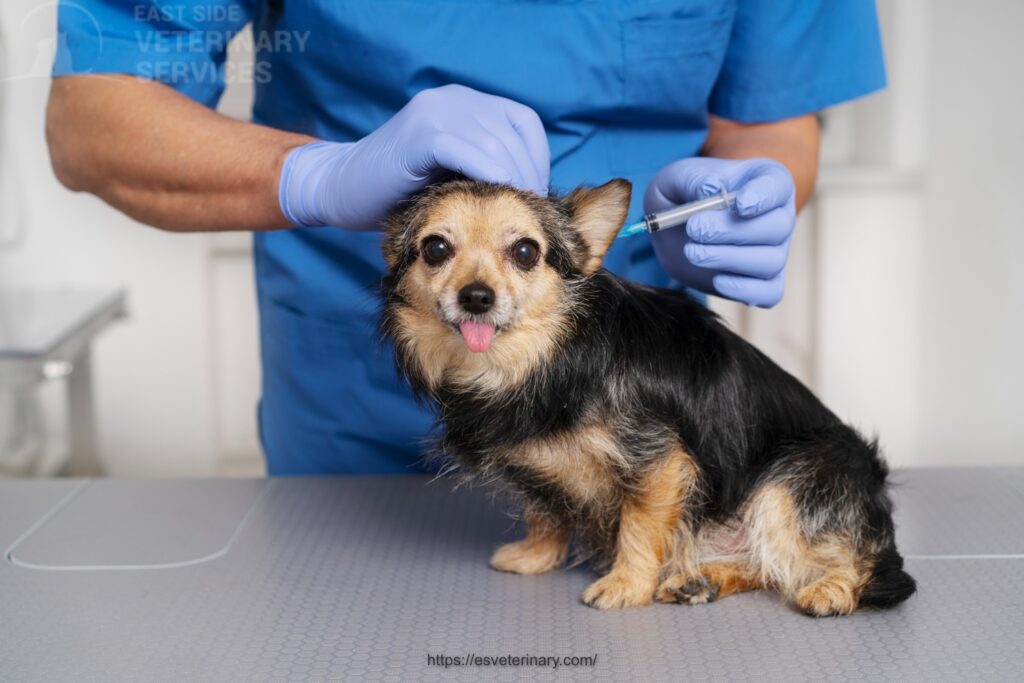Welcome to Eastside Veterinary Services! As pet owners, ensuring the health and well-being of our furry companions is a top priority. One crucial aspect of pet care is vaccination. Vaccines protect our pets from a variety of infectious diseases, helping them lead healthier, longer lives. In this guide, we’ll outline the vaccination schedules recommended for puppies, dogs, kittens, and cats, helping you stay informed and proactive about your pet’s healthcare needs.

Vaccination Schedule for Puppies: Puppies are especially vulnerable to infectious diseases, making timely vaccinations essential for their health. Here’s a typical vaccination schedule for puppies:
- 6-8 weeks: Distemper, Parvovirus, Hepatitis, and Parainfluenza (DHPP) combination vaccine.
- 10-12 weeks: DHPP combination vaccine booster.
- 14-16 weeks: DHPP combination vaccine booster, along with the rabies vaccine.
- 12-16 weeks: Bordetella vaccine (for kennel cough) may be administered if recommended by your veterinarian.
- 14-16 weeks: Lyme disease vaccine (if necessary based on geographical location and lifestyle).
It’s important to follow up with regular booster shots as advised by your veterinarian to maintain immunity throughout your puppy’s life.
Vaccination Schedule for Dogs: After the initial puppy vaccinations, dogs require regular booster shots to maintain immunity. Here’s a general vaccination schedule for dogs:
- Annually: DHPP combination vaccine booster.
- Annually or every three years: Rabies vaccine (duration may vary based on local regulations).
- Every 6-12 months: Bordetella vaccine (if your dog is frequently exposed to other dogs, such as in boarding facilities or dog parks).
- Every 6-12 months: Lyme disease vaccine (based on geographical location and lifestyle).
Your veterinarian may recommend additional vaccines based on your dog’s risk factors and lifestyle.
Vaccination Schedule for Kittens: Just like puppies, kittens need a series of vaccinations to protect them from common infectious diseases. Here’s a typical vaccination schedule for kittens:
- 6-8 weeks: Feline viral rhinotracheitis, calicivirus, and panleukopenia (FVRCP) combination vaccine.
- 10-12 weeks: FVRCP combination vaccine booster.
- 14-16 weeks: FVRCP combination vaccine booster, along with the rabies vaccine.
- Optional: Feline leukemia vaccine, especially for outdoor cats or those in multi-cat households where exposure is higher.
Regular booster shots are essential to maintain immunity throughout your kitten’s life.
Vaccination Schedule for Cats: Adult cats require regular vaccinations to ensure continued protection against infectious diseases. Here’s a general vaccination schedule for cats:
- Annually: FVRCP combination vaccine booster.
- Annually or every three years: Rabies vaccine (duration may vary based on local regulations).
- Optional: Feline leukemia vaccine, based on lifestyle and risk factors.
As with dogs, additional vaccines may be recommended based on your cat’s individual needs.
Conclusion: Vaccinations are a cornerstone of preventive healthcare for pets, protecting them from serious and potentially life-threatening diseases. By adhering to recommended vaccination schedules and staying informed about your pet’s healthcare needs, you can help ensure a long and healthy life for your furry friend. Remember to consult with your veterinarian to tailor a vaccination plan that is specific to your pet’s needs and lifestyle. At Eastside Veterinary Services, we’re here to support you in keeping your pets happy and healthy for years to come.